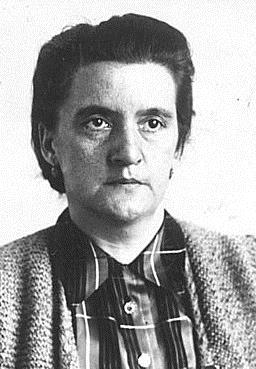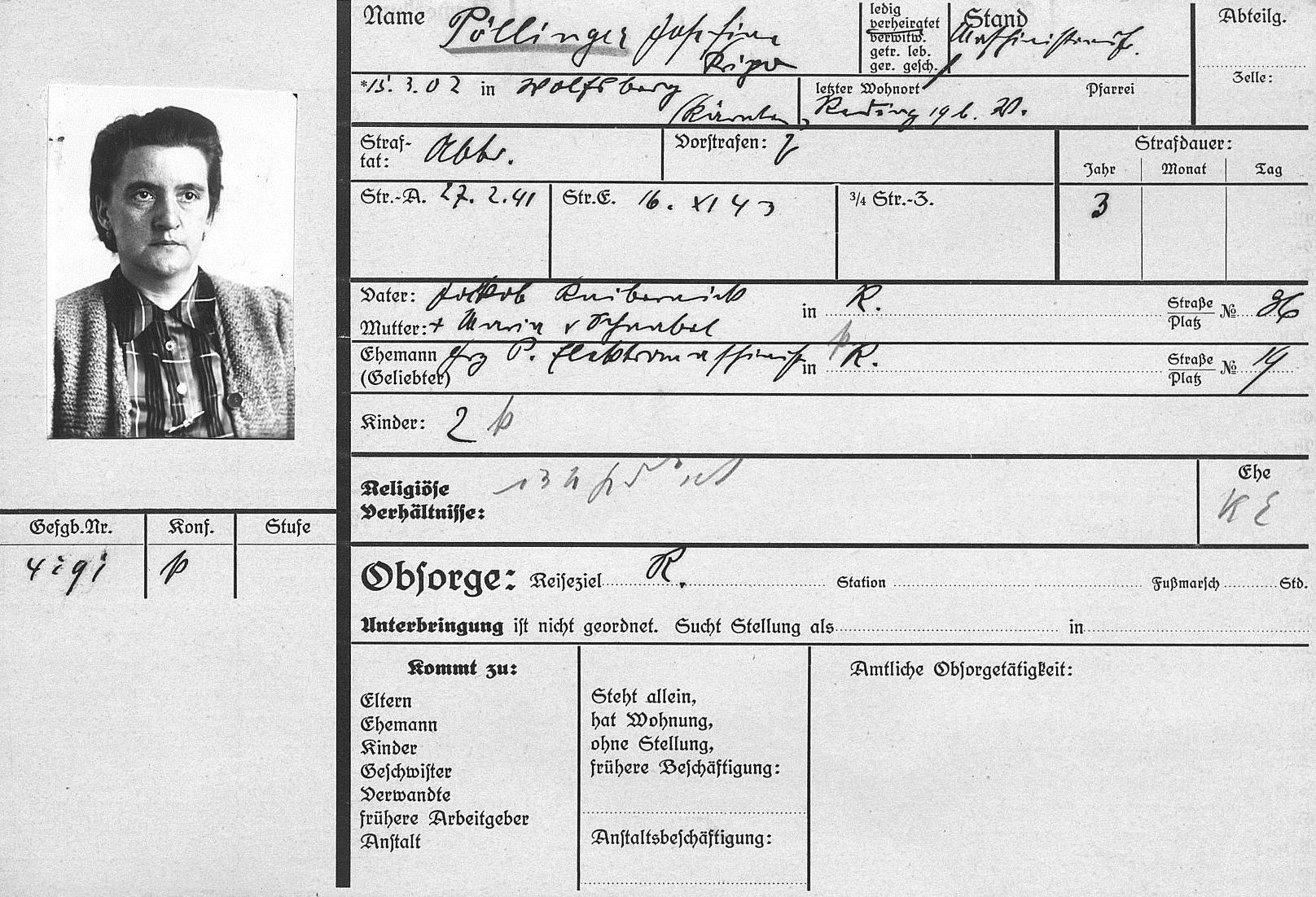 | Josefine Pöllinger
Geboren am 15. März 1902 in Wolfsberg, Kärnten Verfolgungsgrund: Kriminell Biografische Daten |
In 2011 I was given a tour around the memorial site at former Ravensbrueck concentration camp. A midwife was presented to us as one of the heroines of Ravensbrueck. In fact, that midwife who was known by the pet name ‘Fini’ seemed to be one of the central persons in the narrative of the memorial site. Though, nobody knew who Fini was or what her story was before and after Ravensbrueck.
The Ravensbrueck concentration camp
Between May 1938 and April 1939, the SS erected a concentration camp for women in the village of Ravensbrueck close to the town of Fürstenberg about 80 km from Berlin. The women who were detained included political opponents to the Nazis, Jehovah’s Witnesses, so‑called “antisocial elements”, Romnija, women from the occupied states, Jews or those labelled as “professional criminals.”
To provide forced labourers to extend the buildings, a men’s camp was built close by in 1941. In 1942 the “Uckermark juvenile protective custody camp” for girls and young women was opened in the immediate neighbourhood of the women’s camp. Until 1945 more than 150.000 women, men and girls from more than 40 nations were detained in Ravensbrueck. Tens of thousands died of hunger or disease, in medical experiments, in the “euthanasia” facility in Bernburg in Saxony-Anhalt or, from 1944 on, in the gas chamber of Ravensbrueck.
A commercial abortionist
This was the place where the midwife Pöllinger from Austria was deported to in 1943. Josefine was born on March 15, 1902 in the village of Wolfsberg in Carinthia, Austria. She was divorced, had two daughters and had worked as a freelance midwife since 1926.
In January 1936, Josefine Pöllinger was given three-month’s probation by the regional court of Carinthia for performing an abortion on a 15‑years old girl. Another suspected case in 1937 didn’t lead to an arraignment.
In March 1939 she was again sentenced to seven months in prison, because she had performed an abortion in the course of which a young woman had died.

Karteikarte Zuchthaus Aichach von Josefine Pöllinger (Staatsarchiv München, JVA 8385)
Because of a further abortion, Pöllinger was sentenced to three years in jail in 1941. Up to this point her sentences cannot be regarded as the excesses of an arbitrary justice. Her deeds would have been punishable in every European state and under every political system.
Imprisonment in the Ravensbrueck concentration camp
Pöllinger became a Nazi victim when she was deported to Ravensbrueck concentration camp after she had already served her prison sentence. This happened probably, because she counted as a persistent offender.
Sylvia Salvesen (1890-1973), a Norwegian resistance pioneer, met Josefine Pöllinger who became known as Fini in the sick-bay:

Karteikarte Zuchthaus Aichach von Josefine Pöllinger (Staatsarchiv München, JVA 8385)
Thanks to Fini I was able to run in now and again, smuggle in a little food or a cup of warm gruel when I managed to evade Matron’s vigilant eye. Fini herself was ill, but she was untiring in her efforts to help everyone in Room 3. There were thirty-eight patients herded together in one room, often two in a bed, the beds in two rows one above the other. Stench, dust, dirt, vermin abounded, the dead and the dying were all together. Fini begged wood to keep the tiny stove going. She rushed from bed to bed with the one and only bedpan. She cleaned up patients as well as she could, for most of them were so weak they were incontinent. (…) I saw Fini in so many situations, always helpful, always with a friendly word or a smile.[1]When more and more pregnant women were deported to Ravensbrueck Josefine Pöllinger was forced to work as a midwife again. Reporting this Sylvia Salvesen also mentioned Pöllinger’s background:
What irony of fate it was that sent Fini to Ravensbrueck. She had been given a green square [A green square marked detainees as “criminals”.] because, in the pity of her heart, she had helped an exhausted mother of six children, who had not the strength to bear another, to have an abortion in order to save her life. In Germany abortion is one of the crimes that is punished by four years in a house of correction. She had these four years behind her when she came to Ravensbrueck. As a result her lovely tired eyes were stiff with fright.[2]Solidarity and devotion Salvesen’s narrative of Pöllinger’s background, however, was incomplete. She didn’t know or didn’t want to tell that Fini had been sentenced due to several abortions. It is impossible to judge Pöllinger’s motive for the abortion, but we have to take into consideration that Pöllinger took money for the abortions[3], which made her a commercial abortionist. In Ravenbrueck Josefine Pöllinger showed outstanding engagement and devotion:
Fini worked day and night. She was almost dropping from fatigue, but she stuck to it manfully. (…) Fini, how endlessly patient, how good, you were! You are enthroned in the hearts of thousands of Ravensbrueck’s unhappy slaves.[4]We don’t know yet whether Josephine Pöllinger experienced the liberation of the camp on site or whether she was sent on a death march like thousands of other concentration camp inmates. However, she survived Ravensbrueck. In August 1945 she returned to Wolfsberg for a short period before she moved away. The entry in the residence register is illegible. Her further biography remains unknown to this day. Until now Josefine Pöllinger was more of a legend than a role model. Taking her life as a real person into consideration – including the breaks, the questionable decisions and the heroic deeds – makes her palpable, a midwife who seems to have surpassed herself. Maybe now Josefine Pöllinger, the midwife of Ravensbrueck, will find her place not only within the context of the memorial site, but also in the Who’s Who of Austrian and German midwives history. © Dr. Anja Katharina Peters[5] [1] Salvesen, Sylvia (1958), Forgive – But do not forget. London / Melbourne / Sydney / Auckland / Bombay / Toronto / Johannesburg / New York: Hutchinson, p 98−99. [2] Salvesen, Forgive – But do not forget, p 100. [3] See KLArch, AT KLA 72 Klagenfurt, Landgericht: Strafakten, Sig. 72−49 Su, Zl. 9 Vr E 2407/35 and T KLA 72 Klagenfurt, Landgericht: Strafakten, Sig. 72−69 Su, Zl. 8 Vr 8/39. [4] Salvesen, Forgive – But do not forget, p 101. [5] The biography of Josefine Pöllinger was first published by the author under the title “Josefine Pöllinger. The Midwife of Ravensbrück”, in: The Bulletin of the UK Association for the history of nursing volume 7/2019, pp 74−77. It is a shortened version of a paper presented by the author at the conference “Bads in healthcare – Negative Experience as an Impetus to Reform in the Nineteenth and Twentieth Centuries” in Winterthur, Swizerland, on 22nd June 2018.